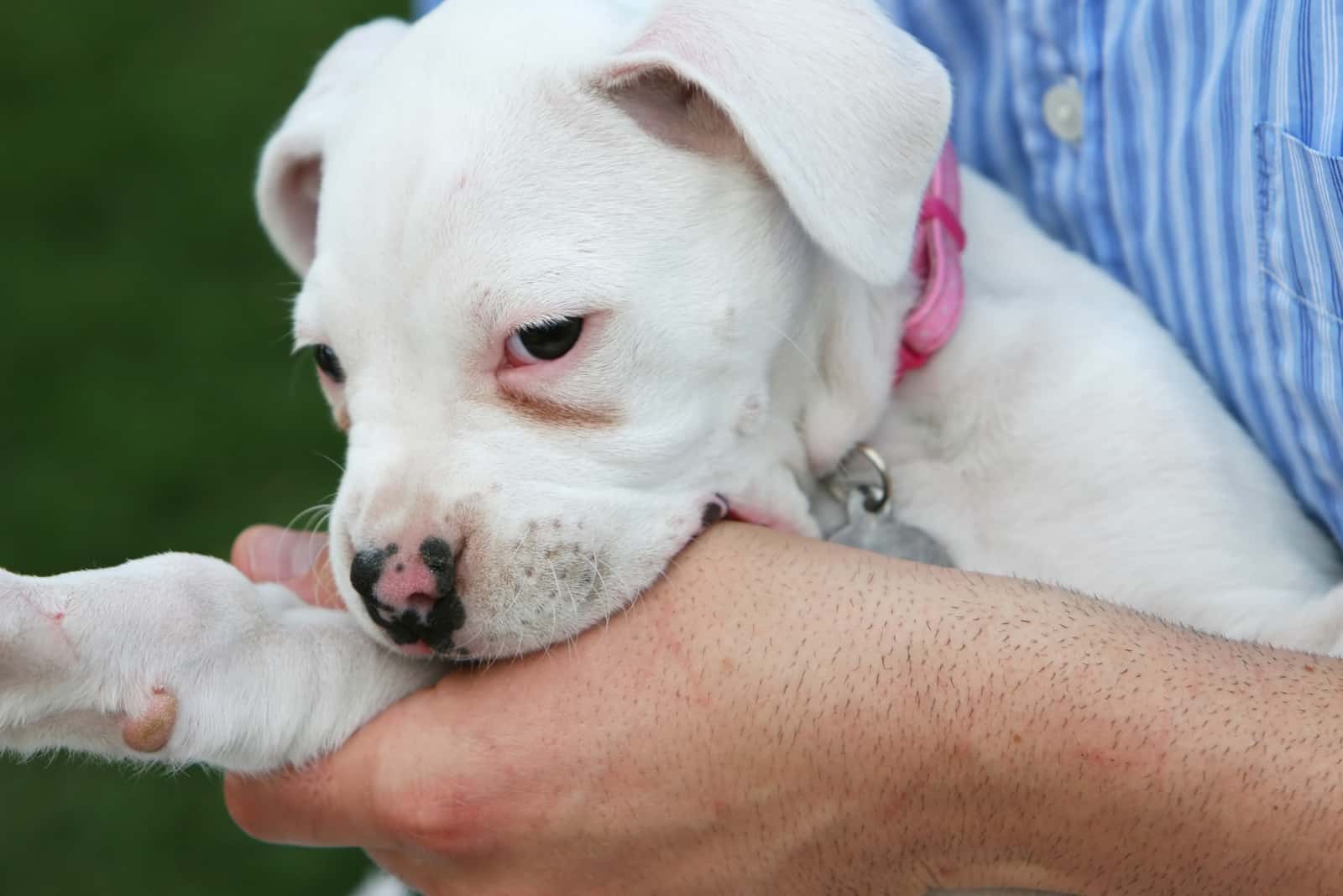If you’ve noticed that your dog likes to gently nibble on things such as blankets, the necks of other dogs, or your hands with their front teeth, you’re likely wondering if this is normal canine behavior.
It’s especially common for first-time dog owners to wonder whether or not something is wrong with their pup when they exhibit this odd type of body language.
Nibbling, cobbing, or dog corn cobbing are all just synonyms for the same type of dog behavior that is predominant in puppies but is also not a rare sight to see in adult dogs too.
Some dogs will continue to gently nibble on their owners, themselves, or other dogs as they grow, and while it might sometimes be a cause for concern – it’s most likely not a huge problem and will usually just elicit some lols.
However, it’s important to understand this peculiar canine behavior in order to determine whether you should intervene or not.
So, why does my dog nibble on things you ask?
There isn’t one straightforward answer to this question because all dog breeds nibble for many different reasons, which we’ll explain in this article – the two most common reasons, however, are stress relief and displays of affection.
Dog corn cobbing is an instinctive behavior that usually develops when puppies are still just a couple of weeks old and while some dogs grow out of this behavior, other dogs continue to exhibit nibbling as they grow older.
If this behavior is an often occurrence with your doggy and you’re wondering if there’s a method to the madness – read on to find out the reasons behind dog corn cobbing and what you can do to potentially curb or prevent the behavior.
What Is Dog Corn Cobbing?
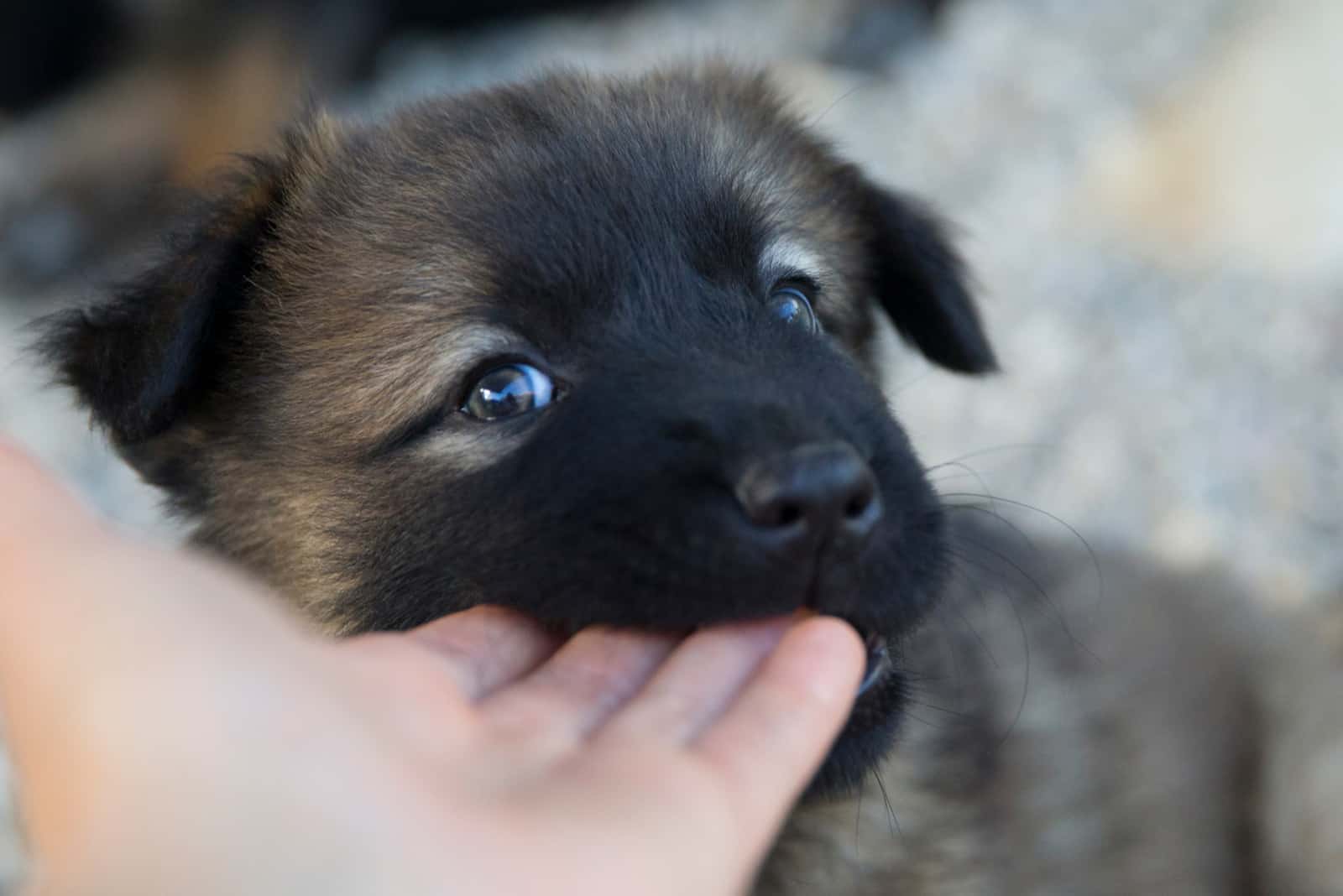
The behavior of dogs nibbling on things with their front teeth was dubbed corn cobbing due to it resembling the behavior of humans eating corn on the cob – pretty self-explanatory, right?
Corn Cobbing is a behavior that dogs exhibit for many different reasons, and it’s essential to determine these reasons in order to know whether you need to intervene or not.
Nibbling is usually a gentle and non-threatening action, as opposed to nipping or biting, which is a display of aggressive behavior.
Corn Cobbing is most common in young puppies and is usually an instinctive behavior.
Cobbing is not meant to be a sign of aggression and is instinctual for all breeds of dogs, especially when they’re puppies – the distinctive motion of their front teeth is used to stimulate milk production when puppies rely on their mother’s milk for survival during their first seven to eight weeks.
Other times, softly nibbling on objects can help puppies relieve the pain of teething.
You might’ve also heard the term Pibble nibble used as a synonym for dog corn cobbing – however, although this refers to the same behavior, Pibble nibble is the term used to describe the behavior of nibbling in Pit Bulls.
Why Is My Dog Corn Cobbing?
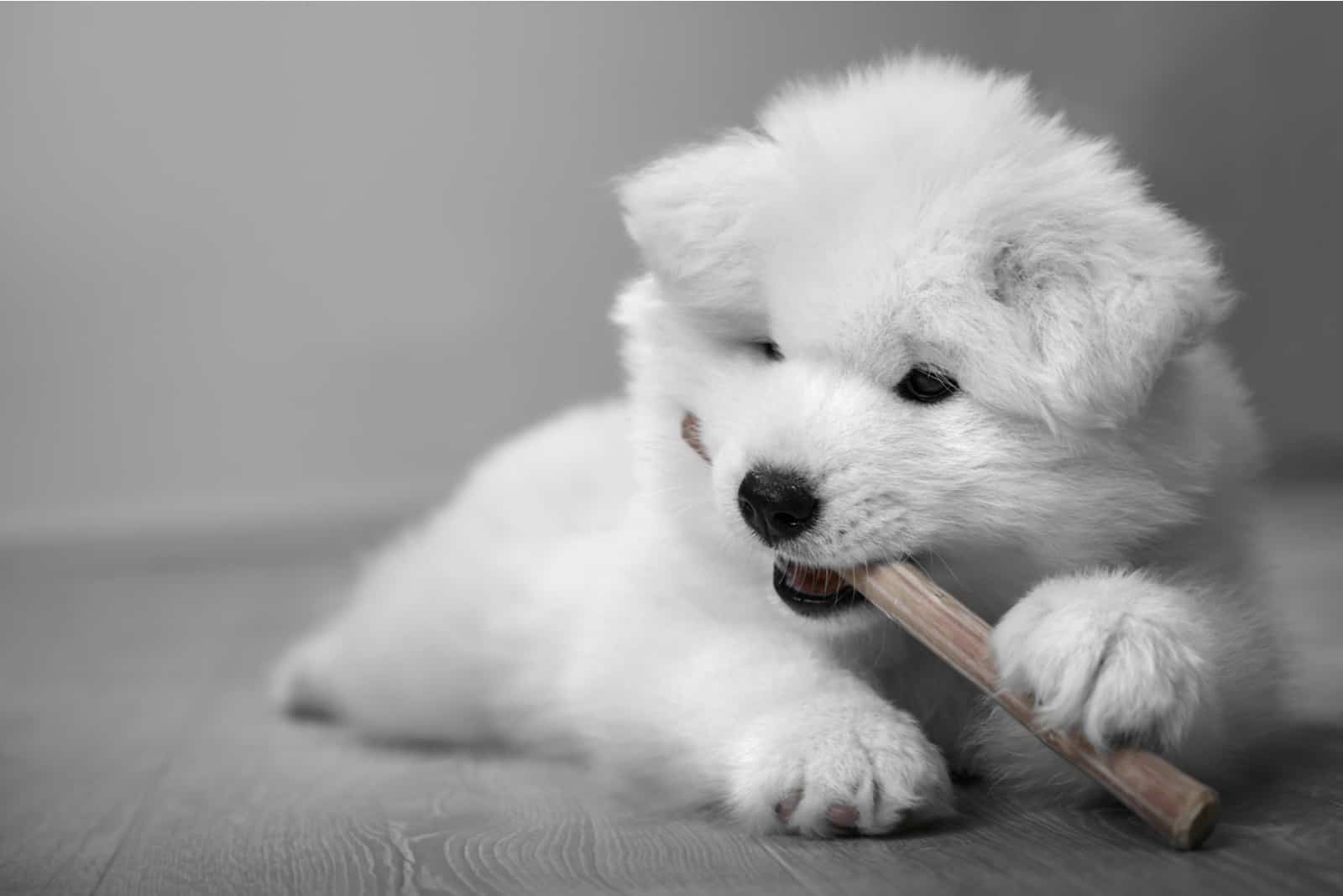
As we’ve already mentioned, corn cobbing is mostly seen in puppies, and as dogs grow older, the majority of them stop displaying this behavior, albeit some old dogs might still like to nibble for various reasons.
So, let’s go over the seven reasons why your dog might be corn cobbing.
1. It’s Common Puppy Behavior
The first reason behind dog corn cobbing is really the most obvious one – newborn puppies nibble on the teat of their mother in order to stimulate the secretion of milk.
Puppies will also often nibble at their littermates during playtime, to show affection towards their siblings while relieving the pain of teething at the same time.
Another thing worth noting (that falls under the common puppy behavior category) is oral fixation – just like how we go through a stage of oral fixation, puppies are also prone to mouthing all sorts of objects.
It’s a normal part of puppy development as a pooch begins to explore their surroundings and everything in it – but, since dogs don’t have opposable thumbs, they tend to investigate with their mouths.
However, since young puppies are so curious, they tend to be attracted to eating feces – which can lead to problems if this isn’t addressed properly.
The best way to divert your pup’s attention elsewhere while still encouraging oral investigation, is to buy your pup a dog chew toy or a food-dispensing puzzle – these will help your puppy build their self-confidence and ease the uncomfortable pain of teething.
As a responsible pet owner, make sure not to give your puppy too much attention or punish them when they display poop-eating behavior, since there’s a good chance that this will only reinforce their behavior.
On the other hand, if your puppy is not simply nibbling on you but rather biting a bit harder than you’d like, resembling a more serious dog bite – there are 10 ways to stop a puppy biting.
If this isn’t discouraged in time, puppy biting can easily turn into adolescent biting, and might even develop into adult dog biting.
2. Oral Fixation
As we’ve already mentioned, specific experiences throughout a dog’s life could lead to a puppy’s oral fixation persisting past puppyhood – some puppies may become frustrated when their natural reflexes aren’t allowed to take place.
Puppies who are prevented from suckling, are weaned too early, or are bottle-fed from a young age may develop abnormalities such as oral fixation in adulthood, which manifests itself as compulsive sucking and licking.
Another factor that comes into play when talking about oral fixation in dogs is genetics. Some dog breeds, such as the Golden Retriever, are known to have an oral fixation that persists throughout the entirety of their lives – it’s believed that this is due to their retrieving heritage.
Other dog breeds, such as the Doberman, are notorious for having an insatiable suckling drive, which leads to persistent compulsive flank and blanket sucking – although these behaviors tend to emerge before a dog reaches sexual maturity and seem to be caused by stress or anxiety.
If you have a male dog that hasn’t yet reached their sexual maturity stage but is on the cusp of reaching it, you should watch out for the signs that a male dog wants to mate – so that you can act accordingly.
The problem with this kind of compulsive sucking and licking behavior is that over time, it can start to take place even in the absence of obvious external stressors – when this happens it can be challenging to overcome, since a dog usually exhibits this kind of behavior as a coping mechanism.
When dogs engage in this kind of coping behavior it usually causes their brains to increase the production of endorphins, which in turn, only reinforces the behavior, creating a never ending cycle.
3. It’s A Sign That They Want To Play
If your dog is often corn cobbing you, it could be a sign that they just want to engage in some quality playtime with you.
When they’re young, puppies will nibble on their littermates as an instinctive way of playing with each other and socializing.
This ingrained instinct to nibble on their littermates can translate into puppies nibbling on their owners – most often when they’re separated from their siblings, puppies will turn their attention towards their owners, since they view them as part of their pack.
So, your puppy nibbling on you might just be a way for your best friend to let you know they just want a bit of attention.
Another pretty common behavior in young puppies who are on the brink of reaching their sexual maturity stage, is mounting – although it might seem like sexual behavior and most people think to themselves: “ can dogs get sexually attracted to humans?” – there are valid reasons for this behavior and none of them are sexual in nature.
4. It’s A Sign of Affection
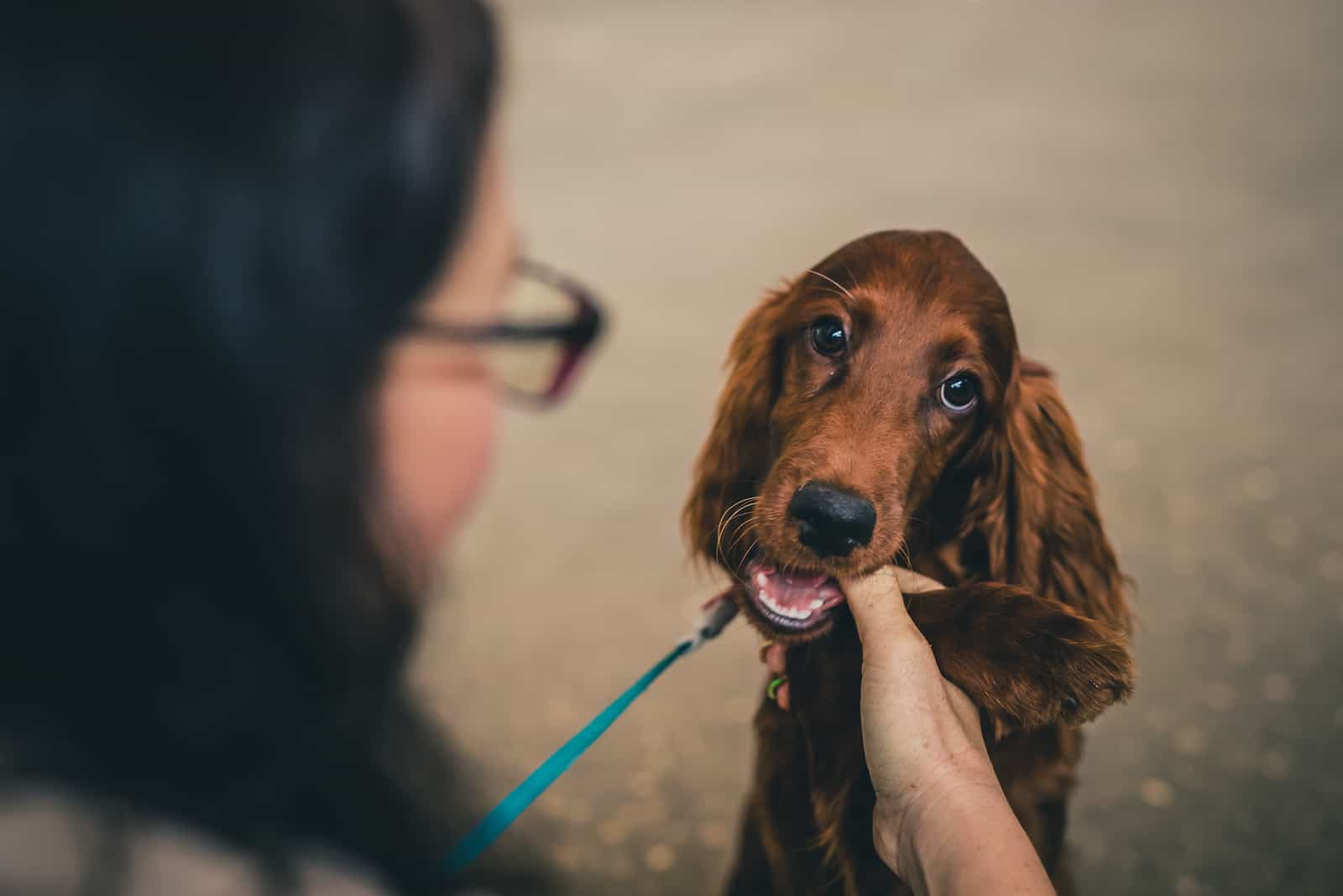
If your dog is nibbling you instead of an object like a blanket, or a part of its own body like the flank, this could also be a sign of affection toward you.
Many dogs like to exhibit nibbling as a sign that they want some snuggles from their owners – in the canine world, this behavior is similar to how we humans hug each other for the same effect.
Your dog nibbling gently on your fingers or your palms might just be a sign that they trust you, are comfortable with you, and want to stay close to you for as long as possible.
If you’ve also been wondering why your dog follows you in the bathroom – It’s worth mentioning that some dogs can be described as velcro dogs, due to their inability (or most likely unwillingness) to leave their owner’s side.
This is usually okay if your dog is able to handle being alone for periods of time when you’re not around. On the other hand, if you notice that your dog tends to be destructive, stressed, or poops in the house as soon as you leave them alone, this might be a clear sign that your pup is suffering from separation anxiety – which is a good segue into our next reason.
5. It’s A Way To Relieve Stress And Anxiety
Separation anxiety in dogs usually manifests itself as more of a destructive, vocalizing, and anxious behavior, due to their owners not being by their side.
Dogs that suffer from separation anxiety usually exhibit these behaviors as soon as their owner leaves, or just as they’re about to leave – and the destructive activity is most often geared toward the owner’s personal possessions.
When dogs feel anxious or stressed, they tend to vocalize their distress in the form of whining or howling – but they also tend to nibble on something as a way to cope with the stress.
This nibbling due to anxiety or stress is usually not a big cause for concern if it occurs periodically, but it could require intervention if it becomes a habit, especially if your dog is restless at night.
If your anxious dog has another dog by their side to keep them company, they might exhibit flea biting as a form of stress relief.
While this is not unusual for dogs to do under normal circumstances and it is just a form of grooming behavior, if they nibble too much they could break the skin and cause injury or infection to themselves or the other dog – which leads us to the next reason.
6. It’s A Type Of Grooming Behavior
All dog breeds exhibit cobbing or nibbling as a form of grooming, whether they’re grooming themselves or another fellow dog – this is similar to grooming behavior that is observed in Chimpanzees, only dogs do it with their mouths.
Dogs will use their front teeth as an efficient tool for removing matted fur, ticks, and fleas, or just as an efficient way to scratch an itch somewhere on their body.
Adult female dogs will also often cob their young puppies to keep them clean and free of ticks and fleas.
7. Bite Inhibition
Another reason behind cobbing might be that your puppy is demonstrating their first signs of bite inhibition.
Bite inhibition (also referred to as soft mouth) indicates a dog’s ability to control the amount of force they exert when they’re mouthing – a puppy who hasn’t yet learned bite inhibition with humans simply doesn’t realize the sensitivity of human skin, so they tend to bite a bit harder than they really want to.
Dog corn cobbing is just a way for young puppies to learn how to control their biting instinct and simply shows that a puppy is gradually learning self-control.
Do Dogs Who Nibble Have A Problem?
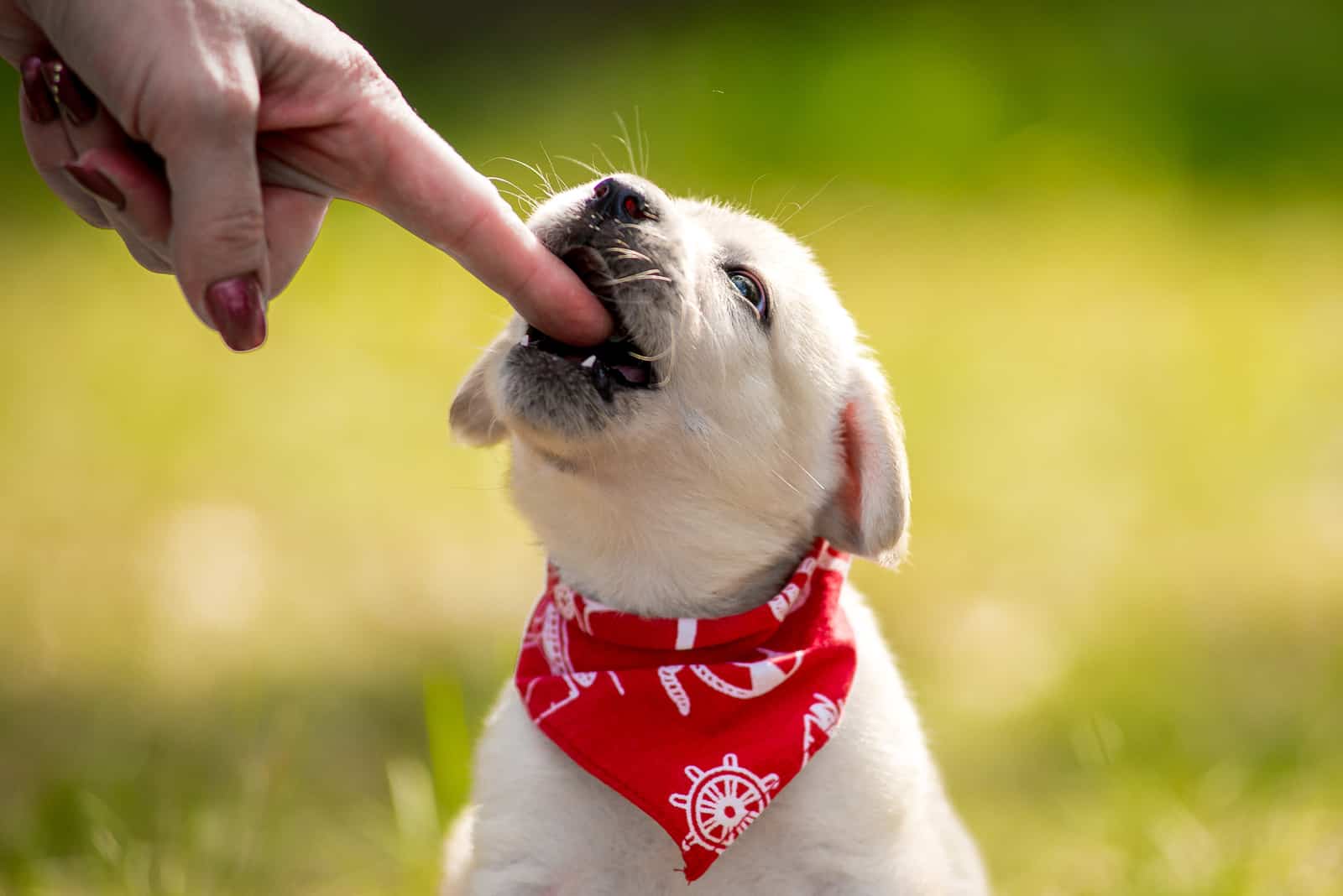
Dog corn cobbing or nibbling shouldn’t always be considered a bad thing.
Dogs spend the majority of their puppyhood horsing around, chewing, and investigating objects in their vicinity, while also playing with their littermates and, of course, humans.
While playing with humans, puppies tend to chew on our toes, fingers, slippers, clothing, and anything else they can get their paws on really.
Although this kind of behavior is cute while the puppy is young and seems harmless, it’s not as comfortable a feeling when they grow into an adult dog – especially for people who are not as comfortable around dogs as other people.
That’s why it’s crucial to learn how to curb your dog’s mouthy behavior in order for them to grow into a well-behaved adult dog.
There are several ways to teach your dog not to nibble, with the ultimate goal being to train them to stop biting altogether.
How Do I Stop My Dog From Corn Cobbing?
If your dog is displaying nibbling behavior and you want to prevent them from continuing the behavior, you might want to try the following.
Determine The Cause Of Nibbling
Before you can act efficiently and correct your dog’s behavior, you need to find out the reason behind it.
It’s best to consult with a veterinarian in order to accurately determine the driving force behind your dog’s behavior.
Your pup might have a skin problem that’s making them itchy, they might be anxious, or if they’re still a puppy, they might be teething – a visit to the vet will help you to get to the root of the problem.
Give Your Dog Something Else To Chew On
The fastest and usually the easiest way to stop your dog from nibbling, is to invest in a durable chew toy – in fact, it’s best to give them multiple chew toys of different sizes and shapes since they will keep your dog from getting bored.
Chew toys and dental cleaning treats are also excellent for young puppies who need to chew on something to relieve the pain of teething.
What Not To Do
You should always avoid waving your hands or feet in your dog’s face – this is actually what drives dogs to nibble or nip you, as they get excited by these actions.
Sudden movements like jerking your hands away from your dog might also entice them to nip at you.
However, that doesn’t mean that you shouldn’t be playful with your pup, only that you should teach them to play gently.
One thing that you should never do is hit your dog just because they nibble on you, this might cause your pup to bite harder out of fear.
In fact, any kind of physical punishment that hurts a dog can make them become afraid of you, which can lead to real aggression.
Some dogs bite out of frustration or fear, which can imply problems with aggression – this is especially true for small dog breeds, such as Chihuahuas, Dachshunds, and Jack Russell Terriers.
It’s hard to know for real if your dog will forgive you for hitting them – but I reckon if you’re not abusing your dog and have only tried to discipline them with physical punishment once or twice, it’s safe to say that your dog will still love you.
In Conclusion
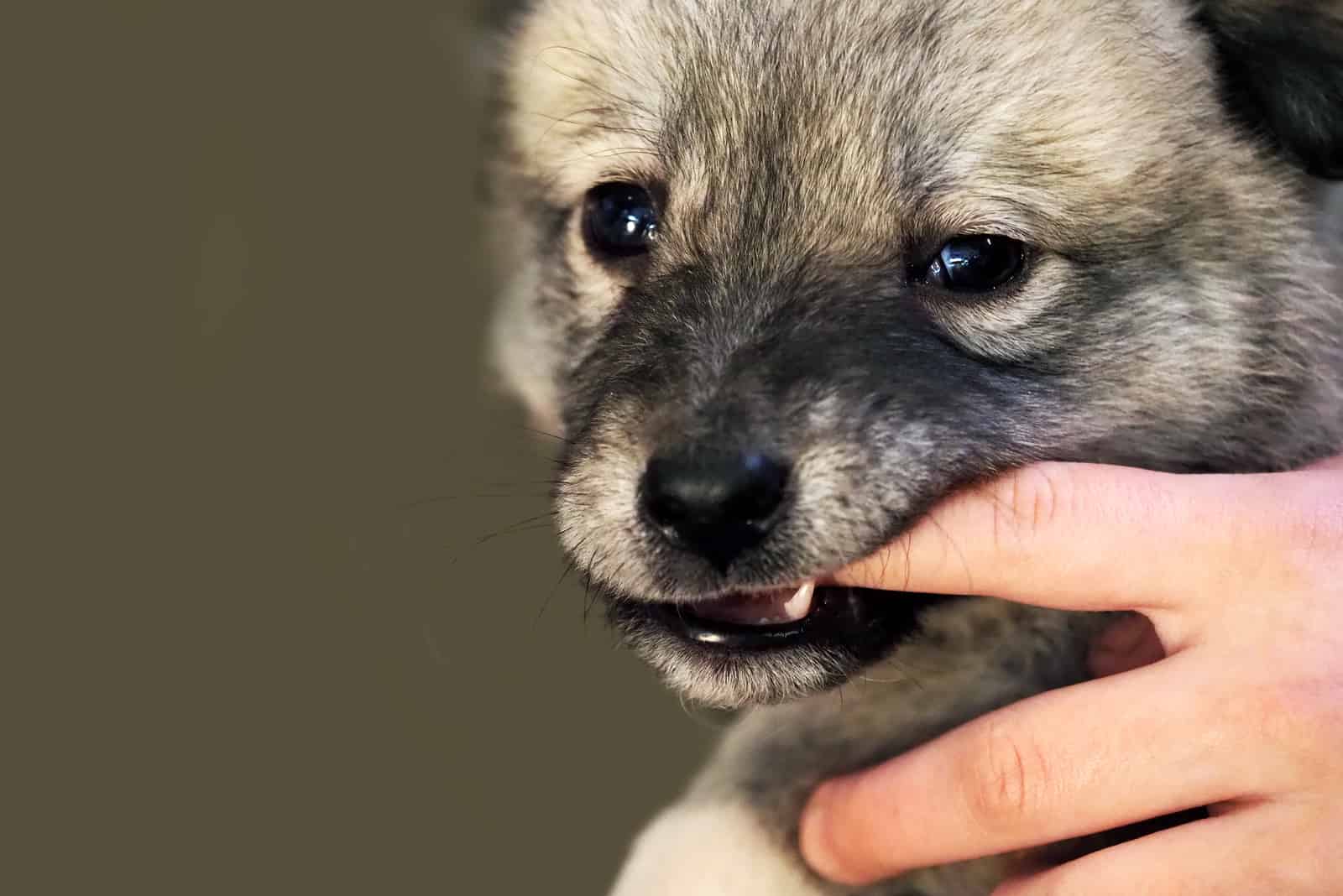
Now that you know what the causes of dog corn cobbing might be, you can react accordingly whenever you observe your puppy nibbling on something and then decide if you should curb the behavior.
Keep in mind that nibbling is an instinctive behavior that puppies usually grow out of, but it’s also not a problem if an older dog does it from time to time.
If the behavior is frequent and more intense with each occurrence, then it may be a cause for concern and you should speak with a veterinarian in order to get to the bottom of it.
If your best friend just likes to nibble gently on your fingers from time to time – it’s likely just a sign that they love you.
